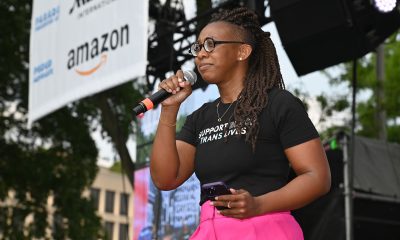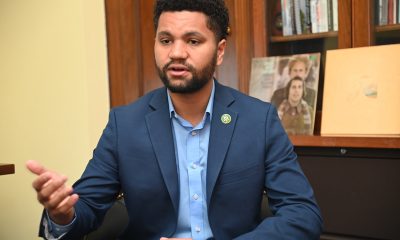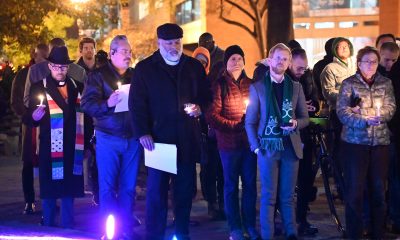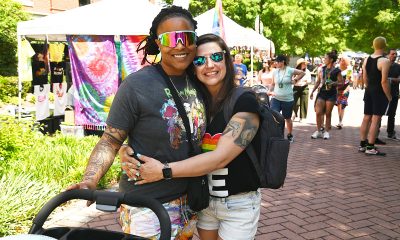homepage news
Parkland shooting inspires new calls for gun reform. Will it be enough?
Gay candidates among those bringing issue to the forefront
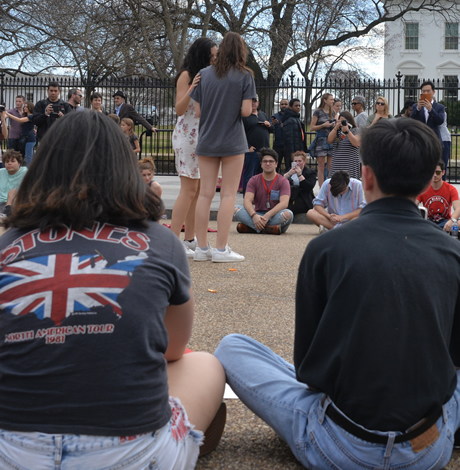
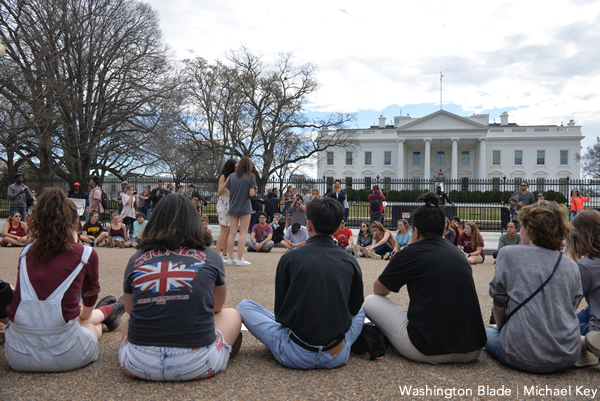
Students and other gun reform supporters protested in D.C. on Wednesday in the aftermath of the Parkland, Fla., mass shooting last week. (Washington Blade photo by Michael Key)
In the aftermath of America’s most recent mass shooting — a tragedy at a high school in Parkland, Fla., that left 17 dead — gun control has emerged as a defining issue ahead of the congressional mid-term elections and LGBT candidates are among those bringing it the forefront.
The LGBT community was energized to enact gun reform legislation after the 2016 mass shooting at Pulse nightclub in Orlando, Fla., but the latest massacre that left 17 people dead at Marjory Stoneman Douglas High School has created new momentum for change that students and gun control advocates are embracing.
That’s particularly true for gay candidates running for Congress in Florida, which was the home state of both the Orlando and Parkland shootings.
David Richardson, who’s currently a state representative in the Florida legislature, is running for the Democratic nomination to succeed retiring Rep. Ileana Ros-Lehtinen (R-Fla.) in Florida’s 27th congressional district.
Richardson said he’s been advocating for gun reform since the Orlando shooting, but the push for change after the Parkland incident “has been larger, if you will,” which he credited to the Florida Legislature being in session.
“We’ve got school kids that are traveling here tonight,” Richardson said. “There will be a rally in Tallahassee tomorrow. There seems to be a willingness on the part of the Republican majority party to listen to a higher degree than they have listened in the past. In fact, at the end of our legislative session today, the speaker announced publicly that they were working on a bill that they hope would be a bipartisan bill regarding guns.”
Richardson also said there’s greater motivation for change after the Parkland shooting compared to the Orlando attack because “the other big difference is that these are school children versus LGBT folks in a nightclub.”
“These are kids and they’re kids from a neighborhood that have some level of financial comfort so that they can afford to come up and allow their voices to be heard and also they’re very articulate,” Richardson said. “I don’t know if you’ve seen some of the speeches, but some of these kids are incredibly articulate and they’re using social media to move their issue.”
There’s general agreement among gun advocates about the solutions that must be enacted: universal background checks, closing the gun-show loophole, ensuring that we can keep guns out of the hands of criminals and the mentally ill, banning bump stocks and restricting assault weapons.
Lauren Baer, who served as a foreign policy expert in the State Department under the Obama administration, is running for the Democratic nomination in the 18th congressional district and cited those solutions as “things that I hear people want in order to keep themselves, their families, their children safe.”
“The issue of gun violence prevention is hugely important to the constituents of Florida-18,” Baer said. “It was important even before the tragedy that happened in Parkland last weekend and it’s even more on people’s minds today.”
Baer’s potential opponent in the mid-term election, incumbent Rep. Brian Mast (R-Fla.), has responded to the Parkland shooting with his own explanation for why the shooting occurred, blaming violence in video games and movies.
“When you look at ‘Call of Duty,’ when you look at movies like ‘John Wick,’ the societal impacts of people being desensitized to killing in ways different than how somebody on the battlefield was desensitized is troubling,” Mast said on National Public Radio’s Morning Edition.
Baer said Mast’s response to the shooting was “disappointing and ill-informed,” referencing that debunked notion that virtual violence inspires mass shootings.
“There’s one thing we know and it’s that video games don’t cause mass shootings, guns in the hands of individuals with bad intentions do, and there are common-sense steps that we can take in our communities and members of Congress can take in order to curb gun violence and keep our children safe,” Baer said.
But we’ve seen the push for change and outrage over inaction before. That hasn’t resulted in change from Congress, nor any consequences for lawmakers holding it up. In fact, after the Pulse shooting, the National Rifle Association-endorsed Trump won election to the White House and Republicans maintained majorities in both chambers of Congress.
Is there any reason to think things will be different in the 2018 mid-term elections? The head of an LGBT group that focuses on gun reform efforts thinks so.
Jason Lindsay, executive director of the Pride Fund to End Gun Violence, said the Parkland shooting “has rekindled the flame of activism in the community.”
“The enthusiasm gap has closed,” Lindsay said. “There’s always been this proposed enthusiasm gap saying that people on the right side are very, very motivated and passionate about gun issues and they’ll vote on it, but voters on the left-end of the spectrum, it’s not that important. Well, that dynamic has definitely changed and gun violence is a top issue for voters.”
Lindsay cited a volunteer meeting that was set for Thursday night in D.C. as evidence of new energy in the fight for gun control. The event, Lindsay said, is one of several volunteer meetings the Pride Fund is coordinating across the country.
Baer said the latest mass shooting will have an impact on the mid-term elections because the victims in Parkland were students and “the children who were cowering under desks and the closets are now rallying in the streets and writing their congresspeople and demanding action.”
“We are here again now still having this conversation after what happened in Parkland, but my hope is that the fact that young people themselves are rallying and demanding that Congress finally do something will actually make the change this time around,” Baer said.
For the upcoming elections, Lindsay said the Pride Fund is focused on drawing attention to lawmakers who receive funds from NRA to stay in office.
The first is Sen. Marco Rubio (R-Fla.), whom Lindsay said accepted $3 million in NRA funding. The other is vulnerable incumbent Rep. Barbara Comstock (R-Va.), whom Lindsay said accepted $137,000 from the NRA, placing her on on the top 10 list of NRA recipient money.
“Because Comstock is such an NRA lackey and because she’s got an ‘A’ rating from them, she has voted time and time again with the gun lobby over the will of her constituents,” Lindsay said.
Richardson, however, had his own take on NRA support, saying donations aren’t where its power lies, but its willingness to take out lawmakers who disagree with it.
“They could easily do without that $1,000 political contribution,” Richardson said. What they can’t do with is having the NRA come after them. Many members of the majority party here feel like if you don’t support the NRA, then not only would they lose that financial contribution to their account, but they would risk the ire of the NRA. And then, the NRA would come after them and spend a half a million dollars to take them out.”
As evidence, Richardson said in 2016 the defeat of Republican Miguel Díaz de la Portilla, once chair of the Florida Senate Judiciary Committee, was orchestrated by the NRA because he refused to allow pro-gun measures to come before the panel. As a result, a Democrat won the seat, but a new Republican took Díaz de la Portilla’s position as committee chair.
Nonetheless, Richardson said he thinks the NRA’s tactics in the mid-term elections will be less effective because “we’re seeing these gun incidents recurring and…the conversation is getting more traction,” which is combined with dissatisfaction with President Trump.
“In the congressional district I’m running in, people just polled it and 55 percent of the people in the district, the Democrats, want to see him impeached,” Richardson said. “Anything that Trump has stood for, including widespread support for the NRA, is going to raise the ire of Democratic voters.”
As pressure builds in the aftermath of the Parkland shooting, movement toward change is already taking place even before the mid-term elections.
President Trump on Tuesday directed the U.S. Justice Department to craft regulations banning bump stocks, which turn semi-automatic firearms into automatic weapons. Such a device enabled the Las Vegas shooter last year to kill 58 people and injure 851 attending a country music concert.
Further, Trump came out in favor of legislation aimed at improving the federal background check system. Various versions of legislation came up in the Senate after the mass shooting, but none have found sufficient support for passage.
In the aftermath of Trump’s newfound support for gun control measures, Richardson said he’d give credit to the president “when it’s done,” expressing skepticism real change will be enacted.
“After Vegas, by the way, there was conversation in Washington, D.C. about banning bump stocks, and that conversation lasted about two weeks and it died,” Richardson said. “I even thought at the time that the NRA may support that, but then everybody just moved off the conversation as soon as the news cycle was done.”
As an immediate remedy, Linsday is calling on Congress to pass legislation sponsored by Rep. Stephanie Murphy (D-Fla.) called the Gun Violence Research Act, which would repeal the Dickey amendment and allow the Centers for Disease Control to study gun violence. The Pride Fund endorsed Murphy in 2016.
“This should be like the one issue that everybody should be able to agree upon,” Lindsay said. “Even if we can’t pass legislation on specific policies at least let’s be able to pass legislation saying let’s let the government study gun violence and what’s causing it to continually get worse and worse.”
In Florida, House leadership brought to the floor legislation that would ban assault weapons in the state. However, lawmakers in the Republican-majority chamber voted 71-36 to table the legislation as student activists watched from the gallery and were emotional.
With energy building for action on gun control legislation, gay congressional candidates see a unique role for the LGBT community going forward because it experienced first-hand gun violence during the Pulse nightclub shooting.
Richardson said the LGBT community he represents in South Florida was affected by the Orlando massacre, but the issue of gun violence is real for all Americans.
“The LGBT community here in South Florida really identifies with what happened in Orlando and it makes it very personal for the LGBT community, but in general that the LGBT community, along with every other community, should be concerned about gun violence prevention,” Richardson said. “We share the same values in that we all just want to be safe on our streets.”
Baer said the LGBT community “knows all too well what it feels like to be the target of gun violence,” which creates a need for LGBT people to work with gun control advocates to institute change.
“This is really a universal issue that can touch neighborhoods and every community across this country, so we really, as members of the LGBT community, need to be working hand-in-hand with our friends, our colleagues, our neighbors and congresspeople to do something about this and make change,” Baer said.
homepage news
Honoring the legacy of New Orleans’ 1973 UpStairs Lounge fire
Why the arson attack that killed 32 gay men still resonates 50 years later

On June 23 of last year, I held the microphone as a gay man in the New Orleans City Council Chamber and related a lost piece of queer history to the seven council members. I told this story to disabuse all New Orleanians of the notion that silence and accommodation, in the face of institutional and official failures, are a path to healing.
The story I related to them began on a typical Sunday night at a second-story bar on the fringe of New Orleans’ French Quarter in 1973, where working-class men would gather around a white baby grand piano and belt out the lyrics to a song that was the anthem of their hidden community, “United We Stand” by the Brotherhood of Man.
“United we stand,” the men would sing together, “divided we fall” — the words epitomizing the ethos of their beloved UpStairs Lounge bar, an egalitarian free space that served as a forerunner to today’s queer safe havens.
Around that piano in the 1970s Deep South, gays and lesbians, white and Black queens, Christians and non-Christians, and even early gender minorities could cast aside the racism, sexism, and homophobia of the times to find acceptance and companionship for a moment.
For regulars, the UpStairs Lounge was a miracle, a small pocket of acceptance in a broader world where their very identities were illegal.
On the Sunday night of June 24, 1973, their voices were silenced in a murderous act of arson that claimed 32 lives and still stands as the deadliest fire in New Orleans history — and the worst mass killing of gays in 20th century America.
As 13 fire companies struggled to douse the inferno, police refused to question the chief suspect, even though gay witnesses identified and brought the soot-covered man to officers idly standing by. This suspect, an internally conflicted gay-for-pay sex worker named Rodger Dale Nunez, had been ejected from the UpStairs Lounge screaming the word “burn” minutes before, but New Orleans police rebuffed the testimony of fire survivors on the street and allowed Nunez to disappear.
As the fire raged, police denigrated the deceased to reporters on the street: “Some thieves hung out there, and you know this was a queer bar.”
For days afterward, the carnage met with official silence. With no local gay political leaders willing to step forward, national Gay Liberation-era figures like Rev. Troy Perry of the Metropolitan Community Church flew in to “help our bereaved brothers and sisters” — and shatter officialdom’s code of silence.
Perry broke local taboos by holding a press conference as an openly gay man. “It’s high time that you people, in New Orleans, Louisiana, got the message and joined the rest of the Union,” Perry said.
Two days later, on June 26, 1973, as families hesitated to step forward to identify their kin in the morgue, UpStairs Lounge owner Phil Esteve stood in his badly charred bar, the air still foul with death. He rebuffed attempts by Perry to turn the fire into a call for visibility and progress for homosexuals.
“This fire had very little to do with the gay movement or with anything gay,” Esteve told a reporter from The Philadelphia Inquirer. “I do not want my bar or this tragedy to be used to further any of their causes.”
Conspicuously, no photos of Esteve appeared in coverage of the UpStairs Lounge fire or its aftermath — and the bar owner also remained silent as he witnessed police looting the ashes of his business.
“Phil said the cash register, juke box, cigarette machine and some wallets had money removed,” recounted Esteve’s friend Bob McAnear, a former U.S. Customs officer. “Phil wouldn’t report it because, if he did, police would never allow him to operate a bar in New Orleans again.”
The next day, gay bar owners, incensed at declining gay bar traffic amid an atmosphere of anxiety, confronted Perry at a clandestine meeting. “How dare you hold your damn news conferences!” one business owner shouted.
Ignoring calls for gay self-censorship, Perry held a 250-person memorial for the fire victims the following Sunday, July 1, culminating in mourners defiantly marching out the front door of a French Quarter church into waiting news cameras. “Reverend Troy Perry awoke several sleeping giants, me being one of them,” recalled Charlene Schneider, a lesbian activist who walked out of that front door with Perry.

Esteve doubted the UpStairs Lounge story’s capacity to rouse gay political fervor. As the coroner buried four of his former patrons anonymously on the edge of town, Esteve quietly collected at least $25,000 in fire insurance proceeds. Less than a year later, he used the money to open another gay bar called the Post Office, where patrons of the UpStairs Lounge — some with visible burn scars — gathered but were discouraged from singing “United We Stand.”
New Orleans cops neglected to question the chief arson suspect and closed the investigation without answers in late August 1973. Gay elites in the city’s power structure began gaslighting the mourners who marched with Perry into the news cameras, casting suspicion on their memories and re-characterizing their moment of liberation as a stunt.
When a local gay journalist asked in April 1977, “Where are the gay activists in New Orleans?,” Esteve responded that there were none, because none were needed. “We don’t feel we’re discriminated against,” Esteve said. “New Orleans gays are different from gays anywhere else… Perhaps there is some correlation between the amount of gay activism in other cities and the degree of police harassment.”

An attitude of nihilism and disavowal descended upon the memory of the UpStairs Lounge victims, goaded by Esteve and fellow gay entrepreneurs who earned their keep via gay patrons drowning their sorrows each night instead of protesting the injustices that kept them drinking.
Into the 1980s, the story of the UpStairs Lounge all but vanished from conversation — with the exception of a few sanctuaries for gay political debate such as the local lesbian bar Charlene’s, run by the activist Charlene Schneider.
By 1988, the 15th anniversary of the fire, the UpStairs Lounge narrative comprised little more than a call for better fire codes and indoor sprinklers. UpStairs Lounge survivor Stewart Butler summed it up: “A tragedy that, as far as I know, no good came of.”
Finally, in 1991, at Stewart Butler and Charlene Schneider’s nudging, the UpStairs Lounge story became aligned with the crusade of liberated gays and lesbians seeking equal rights in Louisiana. The halls of power responded with intermittent progress. The New Orleans City Council, horrified by the story but not yet ready to take its look in the mirror, enacted an anti-discrimination ordinance protecting gays and lesbians in housing, employment, and public accommodations that Dec. 12 — more than 18 years after the fire.
“I believe the fire was the catalyst for the anger to bring us all to the table,” Schneider told The Times-Picayune, a tacit rebuke to Esteve’s strategy of silent accommodation. Even Esteve seemed to change his stance with time, granting a full interview with the first UpStairs Lounge scholar Johnny Townsend sometime around 1989.
Most of the figures in this historic tale are now deceased. What’s left is an enduring story that refused to go gently. The story now echoes around the world — a musical about the UpStairs Lounge fire recently played in Tokyo, translating the gay underworld of the 1973 French Quarter for Japanese audiences.
When I finished my presentation to the City Council last June, I looked up to see the seven council members in tears. Unanimously, they approved a resolution acknowledging the historic failures of city leaders in the wake of the UpStairs Lounge fire.
Council members personally apologized to UpStairs Lounge families and survivors seated in the chamber in a symbolic act that, though it could not bring back those who died, still mattered greatly to those whose pain had been denied, leaving them to grieve alone. At long last, official silence and indifference gave way to heartfelt words of healing.
The way Americans remember the past is an active, ongoing process. Our collective memory is malleable, but it matters because it speaks volumes about our maturity as a people, how we acknowledge the past’s influence in our lives, and how it shapes the examples we set for our youth. Do we grapple with difficult truths, or do we duck accountability by defaulting to nostalgia and bluster? Or worse, do we simply ignore the past until it fades into a black hole of ignorance and indifference?
I believe that a factual retelling of the UpStairs Lounge tragedy — and how, 50 years onward, it became known internationally — resonates beyond our current divides. It reminds queer and non-queer Americans that ignoring the past holds back the present, and that silence is no cure for what ails a participatory nation.
Silence isolates. Silence gaslights and shrouds. It preserves the power structures that scapegoat the disempowered.
Solidarity, on the other hand, unites. Solidarity illuminates a path forward together. Above all, solidarity transforms the downtrodden into a resounding chorus of citizens — in the spirit of voices who once gathered ‘round a white baby grand piano and sang, joyfully and loudly, “United We Stand.”

Robert W. Fieseler is a New Orleans-based journalist and the author of “Tinderbox: the Untold Story of the Up Stairs Lounge Fire and the Rise of Gay Liberation.”
homepage news
New Supreme Court term includes critical LGBTQ case with ‘terrifying’ consequences
Business owner seeks to decline services for same-sex weddings

The U.S. Supreme Court, after a decision overturning Roe v. Wade that still leaves many reeling, is starting a new term with justices slated to revisit the issue of LGBTQ rights.
In 303 Creative v. Elenis, the court will return to the issue of whether or not providers of custom-made goods can refuse service to LGBTQ customers on First Amendment grounds. In this case, the business owner is Lorie Smith, a website designer in Colorado who wants to opt out of providing her graphic design services for same-sex weddings despite the civil rights law in her state.
Jennifer Pizer, acting chief legal officer of Lambda Legal, said in an interview with the Blade, “it’s not too much to say an immeasurably huge amount is at stake” for LGBTQ people depending on the outcome of the case.
“This contrived idea that making custom goods, or offering a custom service, somehow tacitly conveys an endorsement of the person — if that were to be accepted, that would be a profound change in the law,” Pizer said. “And the stakes are very high because there are no practical, obvious, principled ways to limit that kind of an exception, and if the law isn’t clear in this regard, then the people who are at risk of experiencing discrimination have no security, no effective protection by having a non-discrimination laws, because at any moment, as one makes their way through the commercial marketplace, you don’t know whether a particular business person is going to refuse to serve you.”
The upcoming arguments and decision in the 303 Creative case mark a return to LGBTQ rights for the Supreme Court, which had no lawsuit to directly address the issue in its previous term, although many argued the Dobbs decision put LGBTQ rights in peril and threatened access to abortion for LGBTQ people.
And yet, the 303 Creative case is similar to other cases the Supreme Court has previously heard on the providers of services seeking the right to deny services based on First Amendment grounds, such as Masterpiece Cakeshop and Fulton v. City of Philadelphia. In both of those cases, however, the court issued narrow rulings on the facts of litigation, declining to issue sweeping rulings either upholding non-discrimination principles or First Amendment exemptions.
Pizer, who signed one of the friend-of-the-court briefs in opposition to 303 Creative, said the case is “similar in the goals” of the Masterpiece Cakeshop litigation on the basis they both seek exemptions to the same non-discrimination law that governs their business, the Colorado Anti-Discrimination Act, or CADA, and seek “to further the social and political argument that they should be free to refuse same-sex couples or LGBTQ people in particular.”
“So there’s the legal goal, and it connects to the social and political goals and in that sense, it’s the same as Masterpiece,” Pizer said. “And so there are multiple problems with it again, as a legal matter, but also as a social matter, because as with the religion argument, it flows from the idea that having something to do with us is endorsing us.”
One difference: the Masterpiece Cakeshop litigation stemmed from an act of refusal of service after owner, Jack Phillips, declined to make a custom-made wedding cake for a same-sex couple for their upcoming wedding. No act of discrimination in the past, however, is present in the 303 Creative case. The owner seeks to put on her website a disclaimer she won’t provide services for same-sex weddings, signaling an intent to discriminate against same-sex couples rather than having done so.
As such, expect issues of standing — whether or not either party is personally aggrieved and able bring to a lawsuit — to be hashed out in arguments as well as whether the litigation is ripe for review as justices consider the case. It’s not hard to see U.S. Chief Justice John Roberts, who has sought to lead the court to reach less sweeping decisions (sometimes successfully, and sometimes in the Dobbs case not successfully) to push for a decision along these lines.
Another key difference: The 303 Creative case hinges on the argument of freedom of speech as opposed to the two-fold argument of freedom of speech and freedom of religious exercise in the Masterpiece Cakeshop litigation. Although 303 Creative requested in its petition to the Supreme Court review of both issues of speech and religion, justices elected only to take up the issue of free speech in granting a writ of certiorari (or agreement to take up a case). Justices also declined to accept another question in the petition request of review of the 1990 precedent in Smith v. Employment Division, which concluded states can enforce neutral generally applicable laws on citizens with religious objections without violating the First Amendment.
Representing 303 Creative in the lawsuit is Alliance Defending Freedom, a law firm that has sought to undermine civil rights laws for LGBTQ people with litigation seeking exemptions based on the First Amendment, such as the Masterpiece Cakeshop case.
Kristen Waggoner, president of Alliance Defending Freedom, wrote in a Sept. 12 legal brief signed by her and other attorneys that a decision in favor of 303 Creative boils down to a clear-cut violation of the First Amendment.
“Colorado and the United States still contend that CADA only regulates sales transactions,” the brief says. “But their cases do not apply because they involve non-expressive activities: selling BBQ, firing employees, restricting school attendance, limiting club memberships, and providing room access. Colorado’s own cases agree that the government may not use public-accommodation laws to affect a commercial actor’s speech.”
Pizer, however, pushed back strongly on the idea a decision in favor of 303 Creative would be as focused as Alliance Defending Freedom purports it would be, arguing it could open the door to widespread discrimination against LGBTQ people.
“One way to put it is art tends to be in the eye of the beholder,” Pizer said. “Is something of a craft, or is it art? I feel like I’m channeling Lily Tomlin. Remember ‘soup and art’? We have had an understanding that whether something is beautiful or not is not the determining factor about whether something is protected as artistic expression. There’s a legal test that recognizes if this is speech, whose speech is it, whose message is it? Would anyone who was hearing the speech or seeing the message understand it to be the message of the customer or of the merchants or craftsmen or business person?”
Despite the implications in the case for LGBTQ rights, 303 Creative may have supporters among LGBTQ people who consider themselves proponents of free speech.
One joint friend-of-the-court brief before the Supreme Court, written by Dale Carpenter, a law professor at Southern Methodist University who’s written in favor of LGBTQ rights, and Eugene Volokh, a First Amendment legal scholar at the University of California, Los Angeles, argues the case is an opportunity to affirm the First Amendment applies to goods and services that are uniquely expressive.
“Distinguishing expressive from non-expressive products in some contexts might be hard, but the Tenth Circuit agreed that Smith’s product does not present a hard case,” the brief says. “Yet that court (and Colorado) declined to recognize any exemption for products constituting speech. The Tenth Circuit has effectively recognized a state interest in subjecting the creation of speech itself to antidiscrimination laws.”
Oral arguments in the case aren’t yet set, but may be announced soon. Set to defend the state of Colorado and enforcement of its non-discrimination law in the case is Colorado Solicitor General Eric Reuel Olson. Just this week, the U.S. Supreme Court announced it would grant the request to the U.S. solicitor general to present arguments before the justices on behalf of the Biden administration.
With a 6-3 conservative majority on the court that has recently scrapped the super-precedent guaranteeing the right to abortion, supporters of LGBTQ rights may think the outcome of the case is all but lost, especially amid widespread fears same-sex marriage would be next on the chopping block. After the U.S. Tenth Circuit Court of Appeals ruled against 303 Creative in the lawsuit, the simple action by the Supreme Court to grant review in the lawsuit suggests they are primed to issue a reversal and rule in favor of the company.
Pizer, acknowledging the call to action issued by LGBTQ groups in the aftermath of the Dobbs decision, conceded the current Supreme Court issuing the ruling in this case is “a terrifying prospect,” but cautioned the issue isn’t so much the makeup of the court but whether or not justices will continue down the path of abolishing case law.
“I think the question that we’re facing with respect to all of the cases or at least many of the cases that are in front of the court right now, is whether this court is going to continue on this radical sort of wrecking ball to the edifice of settled law and seemingly a goal of setting up whole new structures of what our basic legal principles are going to be. Are we going to have another term of that?” Pizer said. “And if so, that’s terrifying.”
homepage news
Kelley Robinson, a Black, queer woman, named president of Human Rights Campaign
Progressive activist a veteran of Planned Parenthood Action Fund

Kelley Robinson, a Black, queer woman and veteran of Planned Parenthood Action Fund, is to become the next president of the Human Rights Campaign, the nation’s leading LGBTQ group announced on Tuesday.
Robinson is set to become the ninth president of the Human Rights Campaign after having served as executive director of Planned Parenthood Action Fund and more than 12 years of experience as a leader in the progressive movement. She’ll be the first Black, queer woman to serve in that role.
“I’m honored and ready to lead HRC — and our more than three million member-advocates — as we continue working to achieve equality and liberation for all Lesbian, Gay, Bisexual, Transgender, and Queer people,” Robinson said. “This is a pivotal moment in our movement for equality for LGBTQ+ people. We, particularly our trans and BIPOC communities, are quite literally in the fight for our lives and facing unprecedented threats that seek to destroy us.”
The next Human Rights Campaign president is named as Democrats are performing well in polls in the mid-term elections after the U.S. Supreme Court overturned Roe v. Wade, leaving an opening for the LGBTQ group to play a key role amid fears LGBTQ rights are next on the chopping block.
“The overturning of Roe v. Wade reminds us we are just one Supreme Court decision away from losing fundamental freedoms including the freedom to marry, voting rights, and privacy,” Robinson said. “We are facing a generational opportunity to rise to these challenges and create real, sustainable change. I believe that working together this change is possible right now. This next chapter of the Human Rights Campaign is about getting to freedom and liberation without any exceptions — and today I am making a promise and commitment to carry this work forward.”
The Human Rights Campaign announces its next president after a nearly year-long search process after the board of directors terminated its former president Alphonso David when he was ensnared in the sexual misconduct scandal that led former New York Gov. Andrew Cuomo to resign. David has denied wrongdoing and filed a lawsuit against the LGBTQ group alleging racial discrimination.


